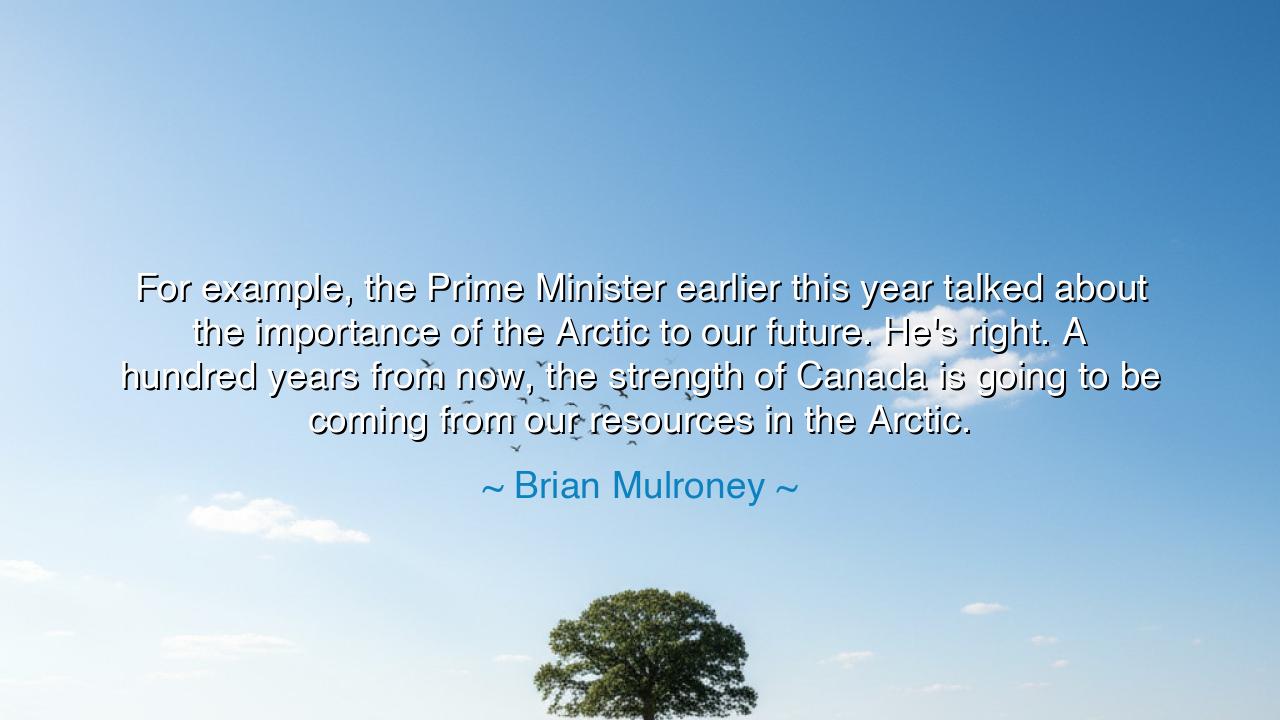
For example, the Prime Minister earlier this year talked about
For example, the Prime Minister earlier this year talked about the importance of the Arctic to our future. He's right. A hundred years from now, the strength of Canada is going to be coming from our resources in the Arctic.






Listen, O Seekers of Wisdom, for the words of Brian Mulroney, who speaks of the profound significance of the Arctic to the future of a great nation. He said, "For example, the Prime Minister earlier this year talked about the importance of the Arctic to our future. He's right. A hundred years from now, the strength of Canada is going to be coming from our resources in the Arctic." These words resonate not only with the urgency of the moment but with the deep awareness that the strength of any people, any nation, comes not only from their current position but from how they harness the resources of their land, how they anticipate the needs of future generations, and how they prepare for the challenges ahead.
To speak of the Arctic as a source of strength is to recognize that within this vast, frozen wilderness lies potential that can shape the future of an entire nation. The Arctic, often seen as inhospitable and remote, holds beneath its icy surface a treasure trove of resources—minerals, oil, and natural gas—that could prove vital for future generations. For Canada, the importance of these resources is not a mere economic concern but a matter of survival and prosperity. The Arctic is the land of tomorrow, and it will be the key to maintaining and even strengthening the nation's global position in the centuries to come. Just as ancient civilizations built their power on the land they inhabited, so too must modern nations understand the resource-rich lands that will sustain them in the future.
Consider, O Seekers, the example of the ancient Romans, whose empire flourished not just through military conquest but through their control over resources. The vast Roman Empire was strengthened by its access to fertile lands, mining operations, and trade routes that spanned the known world. The Romans understood that to build and sustain power, they must both exploit the resources at their disposal and ensure that they continued to thrive long after their own time. Mulroney speaks to this same foresight—the need to harness the resources that will define the nation's future power. The Arctic, like the Roman provinces, is an untapped well of potential, one that must be understood and cared for if it is to secure the nation's strength for the next hundred years.
However, to focus solely on resources would be to miss the deeper lesson that Mulroney offers. The Arctic is not just about exploiting the land for its resources, but about preparing for a future in which the balance between human progress and environmental preservation must be carefully navigated. The ancient Greeks taught us that to master nature was not to dominate it recklessly, but to understand its rhythms and work in harmony with them. Similarly, the strength that comes from the Arctic will require not just extracting its wealth but doing so in a way that respects the delicate balance of nature. For Canada to truly benefit from the Arctic, it must be done with care, foresight, and a commitment to the preservation of the land for future generations.
This is where the wisdom of Mulroney's words shines through. He is calling upon future generations to recognize the Arctic not as a resource to be mined without thought, but as a legacy to be stewarded. The Arctic holds the potential to bring strength to Canada, but this strength will only be realized through careful, responsible management. Canada must approach this vast, frozen expanse not with greed but with the understanding that the resources of the Arctic will define the nation’s role on the global stage, not just for today, but for centuries to come.
Thus, the lesson is clear: the future strength of a nation lies not only in the resources it controls but in how it prepares for the world to come. Mulroney's words remind us that the Arctic is not just an economic asset but a symbol of our responsibility to future generations. We must think ahead, understand the land and its potential, and approach it with a vision that is both practical and respectful. The Arctic may indeed hold the key to Canada’s future, but it is how the people of Canada treat that land—how they balance ambition with sustainability—that will truly determine their strength in the years to come.
So, O Seekers, let us take this wisdom to heart. Let us approach our resources—our lands, our talents, our potential—not just as a means to power but as a legacy to preserve. As we look to the future, let us be guided by foresight, tempered with respect for nature, and a deep understanding that true strength is born from stewardship, not exploitation. Just as the Romans and Greeks understood the importance of managing resources for the long term, so too must we. By doing so, we will ensure that the Arctic and all that it offers will continue to sustain and empower generations to come.






AAdministratorAdministrator
Welcome, honored guests. Please leave a comment, we will respond soon